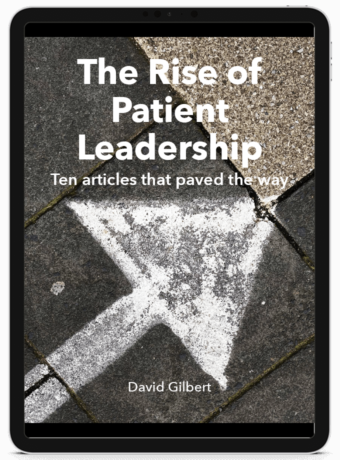Let's (Not) Talk About Depression
A few weeks ago, a friend said: “I love your openness about your mental health problems. But remember some of us are not in your position, some of us do not want to talk. And if I do, I am worried I may lose my job. I think the Let’s Talk campaign is wrong”.
It got me thinking.
Many years ago, I criticised the ‘defeat depression’ campaign, that tried to reduce stigma, owing to its heavy reliance on promotional materials that accentuated drug treatment as first-line therapy. Heavily endorsed and, in some cases sponsored, by big-pharma, it led, in my opinion to biased information materials that emphasised medicalised approaches.
I have more recently gently challenged the ‘zero tolerance of suicide’ campaign. I argued it risked being taken forward in a reductive manner. In a target-driven NHS at a time of competing priorities and confusing decision making, I worried that implementation would mean a loss of its intended holistic focus – concentration on preventing suicide would distract attention from upstream prevention. People would end up ticking boxes related to removing ligature points on wards, for example. I related this to my own experiences on the ward.
Now I have qualms about the ‘Let’s Talk’ campaign on depression.
Let me make myself clear: ‘Let’s Talk’ is a great campaign. It’s got a resonant title, it has no doubt been thought up by wise minds with real involvement of service users. It has been endorsed by celebrities and charities that I respect and admire. And, on the surface, surely it is a good thing – we do need, as a society, (desperately) to talk about the pain and stigma of mental health problems.
However, it is not that simple.
Some people are ‘introverts’. If you have not read Susan Cain’s marvellous book ‘Quiet’, please do. She writes persuasively about how we have shifted as a society, in our work, life and play to one that rewards and values ‘extroversion’ and the ability to be outgoing, demonstrative, collaborative and upbeat. We do not value those who ‘don’t talk’.
Meanwhile, it is intriguing that many of those who have ‘come out’ with mental health problems are those who have least to lose. This is no indictment of their courage. However, it is difficult to think that Stephen Fry, Ruby Wax or Prince Harry are about to lose their status or cred as a result of their bravery. Perhaps the reverse.
I am a Patient Director. My professional status has always been tied to my openness about my mental health problems. Yes, it has been tricky for me to re-negotiate my entry back into working life after having more breakdowns. Yes, it has taken an element of courage to talk about it. But what if I was not established in my career? Would I risk it?
Early on, I lied about my CV to get a job at the Consumer’s Association. I said I had been ‘freelance’ (which is quite funny really… I was seriously ‘freelance’ mentally). Many continue to have to fabricate their history, particularly when climbing a career ladder.
Add to this, that if you have depression, the last thing you want to do is talk. It is indeed ironic that the very trait that is so integral to the state of depression is the one that the ‘sufferer’ needs to stretch themselves to doing – and what if you can’t? What if you are surrounded again by societal messages – in your community, on telly, at the day centre, on the ward, when you go to your GP – that you have to talk. I would be well pissed off. It would make me more depressed.
And remember, for many who have had terrible depression and anxiety (like me), we have been told by mums and dads for years and years to ‘stop thinking so much’. Our inward facing minds, feelings and hearts, our sensitivity and fragility are characteristics that have often been left unsupported by a harsh society. The societal focus on ‘let’s talk, have fun, go to parties’ may have led to our depression in the first place! A campaign to tell us to talk more openly may risk exacerbating our feelings of shame – and shame is a huge issue for us.
And if well-meaning friends and loved ones pick up the ‘let’s talk’ message and interpret that narrowly, then I can well imagine dinner tables where family feuds pick up all over again: “Well, David, the doctors say you have to talk… Come on, son”. “Fuck off, dad”.
I know that is not the ‘intention’ behind the campaign. I know that there is a deep and holistic message underneath. I know that it could help support society to become more accommodating to those of us who have suffered – that a campaign like this can create more space – that it is about safety to talk. But I fear, for some people (not all, I hasten to add) that it can have the reverse effect.
I wonder whether the ‘Let’s Talk’ message will make people and parts of society – in particular those people who are well-meaning, but ignorant of what it means to have mental health problems – feel better about themselves. Perhaps, dare I say it, smug?
I once attended a spiritual community for a week. After one intoxicating workshop, a hundred of us held hands and circled round the room dancing. As the dance circle grew, we surrounded a couple who were having a quiet conversation. We smiled and cajoled, then urged (and in retrospect, bullied) them to join our circle. They were shamed into the ‘Let’s Dance’ campaign.
Let me repeat – I am not against the ‘Let’s Talk’ campaign. But I do have a hunch – borne of my own experiences - that, for some, it may have the reverse effect. It may secure some in their continued silence – through guilt, through shame, through fear.
And, when I meet my friend again, I am going to sit with him in silence and see what happens.
Let's think.
--
If you liked this blog, or even if you didn’t, you might be interested in other at www.futurepatientblog.com - about mental health, patient and public engagement, patient leadership, and a bit of poetry…
© David Gilbert


Can I direct you to purplepersuasion blog, the entry titled Troubles. I think the issues you and she raise are similar, and yet she also raises the issue of severe mental illness being thought of as the same as the sadness people feel when a relationship breaks up. I help out on Depression Support on Healthunlocked and I am still surprised by some of the posts. It is as if people want to be labelled mentally ill, because they think it is the new in thing, the cool thing to have. I am a priest in the church of england, and have bipolar disorder. The Archbishop of Canterbury Rowan Williams signed the Time to Change initiative, and yet I am having to go through the occupational health route so that I can return to ministry. One priest was overheard to say, 'But I don't know when Fiona is well or not'. The stigma I face is worse than being a woman!
Hi. Thank you. I am sorry to read of your troubles (on many fronts). You sound extremely courageous and I wish you all the best. If you would like to stay in touch, please do so. Best wishes
It's an interesting one isn't it? I genuinely think it's up to each individual as to if and when they 'talk'. It's a double edged sword though. We desperately need to reduce the stigma and part of that is by more open talking. So these campaigns can be really helpful in maybe normalising and showing that it's ok to talk. But, and it's a big 'but, before I started being open about my bouts with anxiety/PTSD, and only my partner knew, these campaigns with people proudly saying (and why not) that they have/had anxiety or another condition, to be honest, made me feel even more down and dispirited. Thoughts like 'I could never do that' or feeling somehow inferior because I didn't feel able to talk because of the 'risk'. It was only at the point (unprompted by any campaign) that I wanted to be open that I then started to 'talk', just conversations.... But this led to lots of other people saying to me what they had been going through. I've had lots of thanks and support for speaking out. Friends and people who just don't 'get' mental illness have for the most part stayed silent. That's fine, that's their choice. Your comment about if people feel able to speak out when there's less to lose could be true, and the celebs should be applauded. But my heroes are those everyday people who talk and comment on their mental health as I can relate to them. Although I am anxiety free at the moment, it may come come back or it may not, but as it's such a silent thing, I will always say now if I'm well or not. But it's taken me 17 years to get to that stage so people shouldn't give themselves a hard time if they don't want to!
I agree with all you say!!!!
Perhaps we need another campaign called 'let's listen' because the people without mental health problems need support to understand and accept too. It's like patient involvement work, the non patients need the most training and just as much support to make it really happen!
Yes!